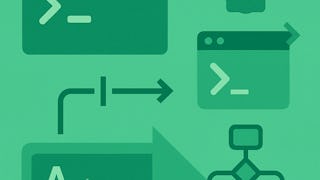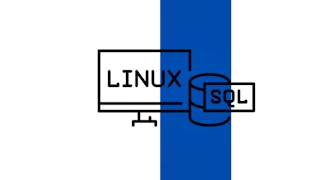Filter by
SubjectRequired
LanguageRequired
The language used throughout the course, in both instruction and assessments.
Learning ProductRequired
LevelRequired
DurationRequired
SkillsRequired
SubtitlesRequired
EducatorRequired
Explore the Linux Commands Course Catalog
 Status: Free Trial
Status: Free TrialSkills you'll gain: Linux Commands, Bash (Scripting Language), Shell Script, File Management, Linux, Unix Commands, Linux Servers, Scripting, Command-Line Interface, Ubuntu, Scripting Languages, Unix, Operating Systems, Network Protocols, Automation, Software Installation
 Status: NewStatus: Preview
Status: NewStatus: PreviewBirla Institute of Technology & Science, Pilani
Skills you'll gain: Linux Commands, Shell Script, Unix Commands, Operating System Administration, Systems Administration, Data Storage, Data Management, Process Management, Software Development, Computer Security
 Status: Free Trial
Status: Free TrialSkills you'll gain: Bash (Scripting Language), Operating Systems, File Systems, Linux Commands, Linux, SQL, Unix, Database Management, Command-Line Interface, Relational Databases, Authorization (Computing), Authentications, User Accounts
 Status: New
Status: NewPackt
Skills you'll gain: Bash (Scripting Language), Shell Script, Ubuntu, Unix, System Software, System Monitoring
 Status: Preview
Status: PreviewSkills you'll gain: Package and Software Management, Command-Line Interface, Linux Commands, Linux, Linux Administration, Unix Commands, File Systems, Data Storage, Network Troubleshooting, Operating Systems, Remote Access Systems, Operating System Administration, System Support, Software Installation, File Management, Service Management, General Networking, Network Security, User Accounts
 Status: Free Trial
Status: Free TrialThe Linux Foundation
Skills you'll gain: Package and Software Management, Linux, Command-Line Interface, File Systems, Unix Commands, Linux Administration, Linux Commands, User Accounts, Operating System Administration, System Configuration, System Monitoring, Operating Systems, Network Monitoring, Graphical Tools
What brings you to Coursera today?
 Status: NewStatus: Preview
Status: NewStatus: PreviewSimplilearn
Skills you'll gain: Package and Software Management, File Systems, File Management, Linux Administration, Unix, Linux Commands, Unix Commands, Command-Line Interface, Operating Systems, System Monitoring, Open Source Technology, User Accounts, Software Installation
 Status: NewStatus: Free Trial
Status: NewStatus: Free TrialSkills you'll gain: Unix Shell, Shell Script, Bash (Scripting Language), Unix Commands, Command-Line Interface, Unix, Network Protocols, Network Troubleshooting, Scripting, TCP/IP, Linux, OS Process Management, File Management, Scripting Languages, Linux Commands, General Networking, File Transfer Protocol (FTP), Network Administration, File Systems, Linux Administration
 Status: NewStatus: Free Trial
Status: NewStatus: Free TrialSkills you'll gain: Apache, Network Troubleshooting, OSI Models, File Transfer Protocol (FTP), Linux Administration, Linux Servers, TCP/IP, Network Protocols, Linux Commands, Linux, Dynamic Host Configuration Protocol (DHCP), General Networking, Virtual Machines, Web Servers, Remote Access Systems, Virtualization and Virtual Machines, Ubuntu, Network Administration, Computer Networking, Network Analysis
 Status: NewStatus: Free Trial
Status: NewStatus: Free TrialSkills you'll gain: Linux Commands, Network Administration, Network Analysis
 Status: Free Trial
Status: Free TrialSkills you'll gain: Linux, Linux Administration, Linux Commands, Linux Servers, Shell Script, Unix, Unix Shell, Systems Administration, Unix Commands, Command-Line Interface, Patch Management, Scripting Languages, Package and Software Management, Virtualization and Virtual Machines, File Systems, File Management, Data Storage, Security Controls, User Accounts, Authorization (Computing)
 Status: NewStatus: Free Trial
Status: NewStatus: Free TrialSkills you'll gain: Apache, File Transfer Protocol (FTP), Linux Servers, Linux Administration, Linux, Web Servers, Remote Access Systems, Command-Line Interface, Unix Commands, File Management, Network Protocols, Network Performance Management, Security Controls
Linux Commands learners also search
In summary, here are 10 of our most popular linux commands courses
- Hands-on Introduction to Linux Commands and Shell Scripting: IBM
- Linux Commands & Shell Scripting: Birla Institute of Technology & Science, Pilani
- Tools of the Trade: Linux and SQL: Google
- Linux Command Line: Packt
- Linux for beginners with Hands-on Labs: KodeKloud
- Linux for Developers: The Linux Foundation
- Essential Linux Training Course: Simplilearn
- Unix and Linux Command Line Mastery: EDUCBA
- Linux Networking - Basics and Beyond: Pearson
- Linux Networking - Basics and Beyond: Unit 3: Pearson










